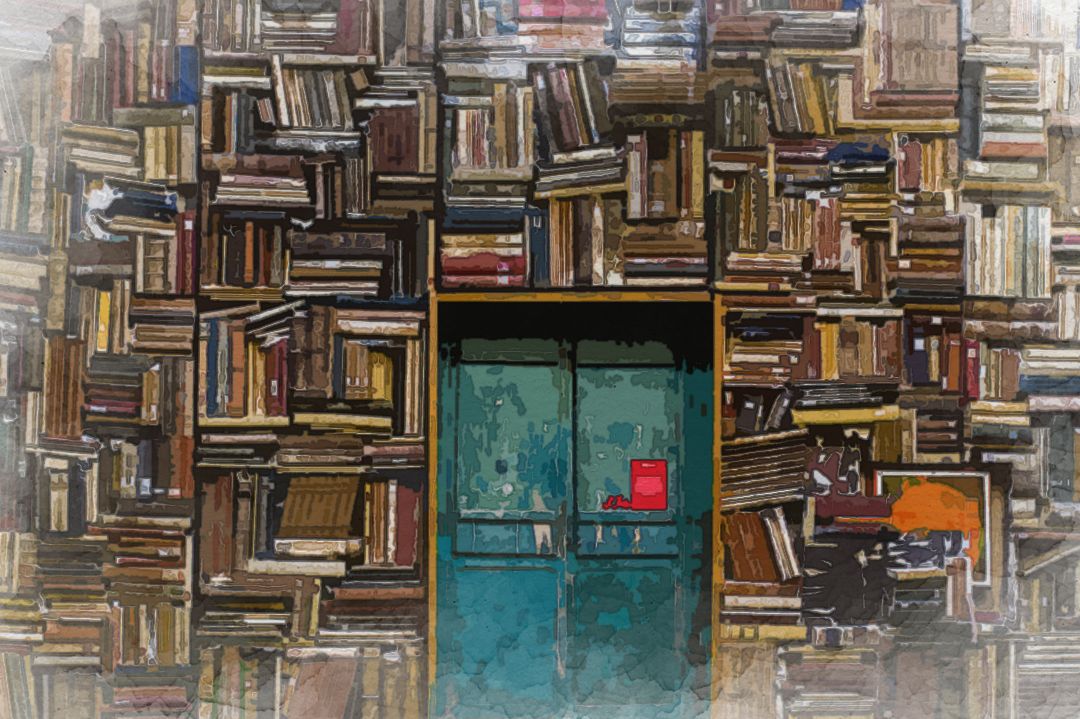Reminds me of Hitch Sans Soul

Entry is Educational
A room without books is like a body without a soul.
— Cicero (106-43 BC)
In the quaint town of Eldoria, a grand old library stood that had long been the heart of the community. Known as The Athenaeum, it was a place where the walls seemed to breathe with stories of ancient times and modern musings. Sophia, a librarian with a penchant for philosophy and a soulful connection to her work, was often found amongst the stacks, her fingers tracing the spines of books as if they were precious artifacts.
Sophia believed in the transformative power of books. She often mused to visitors, echoing Cicero, "A room without books is like a body without a soul." Her identity deeply ingrained this belief, so much so that her home resembled a miniature version of The Athenaeum—books piled high on every surface, each room a testament to her unquenchable thirst for knowledge.
One day, a curious young man named Alexander wandered into The Athenaeum. He was new to Eldoria, having moved recently to take up a post as a teacher at the local school. Drawn by the majestic look of the library, he found himself inside, his eyes widening in awe at the vast collection. It wasn't long before he met Sophia, whose reputation as a guardian of knowledge preceded her.
Sophia and Alexander quickly bonded over their mutual appreciation for literature. She showed him her favourite sections, discussing various authors and genres with a passion that made the words seem to leap off the pages. As their friendship blossomed, Sophia invited Alexander to her home, where he was even more astonished by her personal collection.
The more time Alexander spent with Sophia, the more he understood the depth of Cicero's words. The books did more than fill the rooms; they enriched Sophia's very being, giving her an infectious vibrance. Under her influence, Alexander began to see his own collection not just as teaching tools but as extensions of his soul.
Their shared love for books led them to organize community readings and discussions, revitalizing The Athenaeum’s role as a cultural hub. The town of Eldoria, once quiet and introspective, began to pulse with new energy, as people from all walks of life found common ground in the stories and ideas housed within those sacred walls.
Sophia’s belief that books were the soul of a room—and, by extension, of a community—proved to be a self-fulfilling prophecy. The Athenaeum became more than just a library; it was a sanctuary for those who sought connection, understanding, and enlightenment. Through the pages of the books they shared, Sophia and Alexander taught the people of Eldoria that every room, every heart, and every soul could be filled with the boundless magic of reading.
Always laugh when you can. It is cheap medicine
— Lord Byron (1788-1824)
One particularly grey and drizzly afternoon, which seemed to promise nothing but the monotonous tapping of rain against windowpanes, Sophia decided to infuse a bit of lightness into the library's atmosphere. Inspired by Lord Byron's words, she declared it an impromptu "Day of Laughter" at The Athenaeum. Alexander, always supportive of Sophia's whims, was curious to see how laughter could be woven into the fabric of their solemn sanctuary of books.
Sophia and Alexander rearranged the main reading room, pushing back tables and chairs to create a stage. She invited local storytellers and poets, known for their wit, to share amusing tales and lighthearted poems. The townspeople, initially hesitant, soon filled the library, their faces brightening as laughter began to ripple through the room.
As each performer took the stage, the magic of laughter worked its healing powers. Elderly Mrs. Pennington laughed so heartily that she declared she hadn't felt so young in years. Mr. Jacobs, the stern butcher who seldom cracked a smile, chuckled openly at a particularly clever pun. Children clapped their hands in delight, their laughter mingling with their parents.
Watching the crowd's transformation, Alexander realized the profound truth in Byron's words. Laughter, indeed, was medicine—cheap, yet priceless in its ability to heal and unite. He looked over at Sophia, who was laughing at an old sailor's ridiculous story of a seagull stealing his hat. At that moment, Alexander saw not just the librarian or the intellectual but also a woman who deeply understood the human spirit.
The event was so successful that laughter became a regular feature at The Athenaeum. "Laughter Lounges" were introduced, where books of humour and funny anecdotes were kept for visitors to peruse. Sophia and Alexander discovered that integrating laughter into the library did not diminish its gravitas but rather made knowledge more accessible, reminding everyone that joy and enlightenment could coexist beautifully.
This new tradition did more than cheer people up; it created a stronger, more connected community. It reminded them that even in a place as serious as a library, there was room for lightness and joy, proving that laughter truly was a universal language of the soul, transcending the boundaries of age, occupation, and even literacy.
Certain ineffable stirrings of soul can be imparted by one man to the sensibility of another man through a look, two bars of melody, an almost imperceptible movement. That is the real language of souls, and it remains incomprehensible to the outsider. The word as utterance, as poetic element, may establish the link, but the word as notion, as element of scientific prose, never
— Oswald Spengler (1880-1936)
Sophia and Alexander, encouraged by the success of their "Day of Laughter," decided to introduce another layer to The Athenaeum's cultural repertoire: a monthly event called "Soulful Sundays." This would be a time when the community could gather not just to share laughs or read books, but to experience those ineffable stirrings of the soul through various forms of unspoken language—music, art, and silent reading.
One Sunday, Alexander, who had been learning to play the violin in his spare time, prepared a piece he hoped would touch the souls of those who came to listen. As he played, the notes floated through the library, weaving around the listeners, touching each person in a way that seemed to reach deep into their being. Sophia watched as the expressions on the faces around her shifted—eyes closed, smiles emerged, and some were even moved to tears.
After Alexander's performance, Sophia led a silent reading hour. Everyone was encouraged to communicate solely through gestures and looks, exploring Spengler's idea that the deepest connections between people often go beyond words. The room was silent except for the soft rustling of pages, yet it was alive with a profound sense of community and understanding.
The success of "Soulful Sundays" confirmed Sophia and Alexander's belief in the power of unspoken languages. They saw how music, art, and silent appreciation brought people closer, creating a bond that went deeper than everyday conversations could often achieve. They had created a space where the soul's language could flourish, where community members felt seen and understood on a level that words alone could not reach.
Education is a system of imposed ignorance.
— Noam Chomsky (1928-present)
With The Athenaeum now a well-established cultural and intellectual center in Eldoria, Sophia began to ponder the broader implications of their work. She was struck by a lecture she attended online, where the speaker quoted Noam Chomsky: "Education is a system of imposed ignorance." This phrase resonated with her, prompting a reflection on the traditional education methods that often dominated learning spaces, including libraries.
Determined to challenge this norm, Sophia proposed an innovative project: "The Free Thinker's Space." This would be a new library section devoted to fostering critical thinking and challenging established norms and ideas. Unlike traditional library sections, this area would encourage debates, open dialogues, and even controversial topics, all designed to question what people were taught to believe unquestioningly.
Alexander supported her fully, recognizing that this could be a significant step toward enlightening the community further, promoting a more profound understanding of education as a tool for questioning rather than merely accepting. They introduced a series of workshops and talks, inviting unconventional thinkers, local innovators, and even skeptics to lead discussions.
The initiative was met with mixed reactions at first. Some embraced the challenge, while others were uncomfortable questioning long-held beliefs. However, as time passed, more community members began to value the deepened understanding that came from this rigorous exploration of knowledge. Sophia and Alexander watched as The Athenaeum transformed from a place of quiet reading into a dynamic arena of intellectual challenge and growth.
Through these initiatives—laughter, soul-stirring Sundays, and the Free Thinker's Space—Sophia and Alexander had redefined the library's role in Eldoria. They had created a community hub that not only celebrated the soul of books but also championed the soul of its people, ensuring that every visitor left a little more enlightened, a little more connected, and a lot more curious about the world around them.

The planksip Writers' Cooperative is proud to sponsor an exciting article rewriting competition where you can win part of over $750,000 in available prize money.
Figures of Speech Collection Personified
Our editorial instructions for your contest submission are simple: incorporate the quotes and imagery from the above article into your submission.
What emerges is entirely up to you!
Winners receive $500 per winning entry multiplied by the article's featured quotes. Our largest prize is $8,000 for rewriting the following article;

At planksip, we believe in changing the way people engage—at least, that's the Idea (ἰδέα). By becoming a member of our thought-provoking community, you'll have the chance to win incredible prizes and access our extensive network of media outlets, which will amplify your voice as a thought leader. Your membership truly matters!


